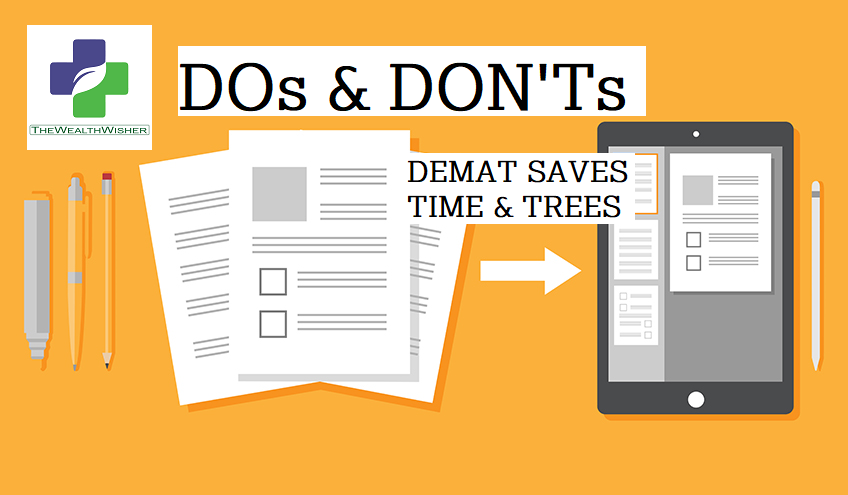DEMAT Account is very common nowadays and they are no more only connected to share markets. Now you can buy Mutual Fund, Exchange Traded Funds, Gold Bonds & NCDs etc in Demat form. Many of these issues are compulsory to be in demat form only. Demat is a facility where all these securities can be kept, accounted and traded with ease.
In India, only two agencies are allowed to open Demat account – NSDL (National Securities Depository Limited) & CDSL (Central Depository Services (India) Ltd. These are also called Depository Participants or just DPs.
Future of investing lies in understanding the functioning of DEMAT Account. The scope of Demat is widening and soon you will find Property related documents and transactions through Demat route.
Since the function of Demat account is to hold securities in paperless form, it becomes a valuable thing. One has to be careful in dealing with it.
![]()
We will glance through the Do’s & Don’ts of dematerialization that an investor should look for.
Remember – In most cases the Demat Accounts come as a bundled with Trading Account (eg ICICI Direct or Motilal Oswal), but these are separate mechanisms, wholly managed by the two DPs. You can transact, interact, modify information independently using online or offline services directly with the DPs.
To begin with, an investor holding a demat account should keep the following Do’s & Don’ts in mind for safety & enjoy the convenience of his demat account.
Do’s of Demat Account
Accept the DIS (Delivery Instruction Slip Booklet) book from your Depository Participant (DP) only if each DIS slip has been pre-printed with a serial number & client id is pre-stamped.
Keep the DIS book in safe custody just as you keep your cheque book in your locker.
In case of a Joint account, ensure that all demat account holder(s) sign on the DIS.
Please strike out any empty spaces on the DIS slip while making use of it.
Cancellations or corrections on the DIS should be initialed or signed by all the account holder(s).
Submit the DIS ahead of the delivery date for all type of market transactions. DIS can be issued with a future execution date.
Scrutinize thoroughly both the transaction and holding statement that you receive. You can opt to receive online alerts by registering with NSDL or CDSL.
Always mention the details like International Securities Identification Number (ISIN), number of securities accurately. (ISIN details can be checked on NSDL & CDSL website).
Intimate any change of address or change in bank account details to your DP immediately.
Register for internet-based facilities to transact & monitor your demat account yourself. You can contact your DP for getting it registered.
Register for SMS Alert facility to receive alerts for debit transfers, credits for IPO, bonus & sub-division, failed instructions, Overdue instructions, change of mobile number, change of address, debit of Mutual Fund units, alerts upon invocation of pledged securities to Pledgor Clients, registration and de-registration of Power of Attorney & modification / cancellation of Nominee name in your demat account.
Before sending securities for demat, record the distinctive numbers of the securities sent.
Before giving Power of Attorney to anyone to operate your demat account, carefully examine the scope & implications of powers being granted.
The demat account has a nomination facility and it is advisable to appoint a nominee, in case of sole account holders.
Ensure that, both, your holding and transaction statements are received periodically as instructed to your DP. You are entitled to receive a transaction statement every month if you have any transactions and once in two quarters if there have been no transactions in your demat account.

Don’ts of Demat Account
Never leave your Delivery Instruction Slip (DIS) book with anyone else.
You should never sign blank DIS as it is equivalent to a bearer cheque.
Do not issue demat Delivery Instruction Slip from any other family members, friend’s accounts. Issue the DIS only from your own demat account.
Avoid over-writing, cancellations, misspellings, changing of the name and quantity of securities.
Do not give general Power of Attorney (POA). Be specific while giving your POA.
Do not share your password with anyone. Do not part with your password and other sensitive account information to anyone. This will preserve the security of your account and of your transactions.
Hope the article will help you embrace the changes that the investment world is going through. As usual, if you have doubts reach out to us – Your WealthWisher on email (madhupam@thewealthwisher.com) or the comments section below.








